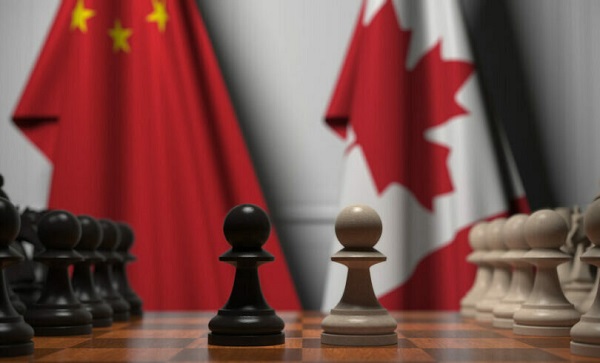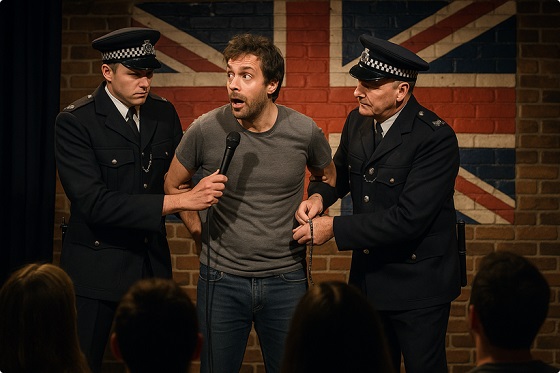espionage
Reporter releases names of 4 Canadian politicians allegedly involved in foreign interference

From LifeSiteNews
Investigative journalist Sam Cooper released a small list of names of those in government he says whistleblowers told him were involved, in some cases wittingly and in other cases unwittingly, in aiding China’s meddling efforts in Canadian politics.
Four politicians along with one government advisor were named as allegedly being involved in a scheme backed by communist China to purposely interfere in Canada’s electoral process.
Investigative journalist Sam Cooper claims that confidential whistleblowers have given him the names of politicians and government workers who wittingly and unwittingly helped China interfere in Canadian politics.
The information came to light Monday during a press conference with Independent Canadian MP Kevin Vuong and Cooper, who were also joined by three foreign interference experts. The group held the press conference to bring to light more details regarding accusations that were made by the House of Commons National Security and Intelligence Committee of Parliamentarians (NSICOP) in the spring of this year.
Thus far, two of those named have denied the allegations, those being Liberal International Trade Minister Mary Ng and Trudeau-appointed Liberal Senator Yuen Pao Woo.
The others named by Cooper include Liberal MP for Steveston—Richmond East, Parm Bains, Guo Ding, who is a journalist as well as an advisor to British Columbia’s recently re-elected Premier David Eby, as well as former Conservative Party senator Victor Oh.
As of press time, none of these individuals have spoken out about the allegations made by Cooper.
In the spring of this year, the NSICOP report implied there were at least 11 unidentified officials who wittingly or unwittingly helped foreign entities, notably China as well as India, in their meddling in the Canadian electoral process.
As for MP Vuong, he has been under investigation for having been targeted by foreign agents and has said that the best solution to “clear the air” is to have all the names in the NSICOP report released.
“Here’s an easy solution to clear the air: Release The Names,” he wrote on X Tuesday in reply to a post from Ng who said it was “unfortunate that Mr. Vuong recently gave Sam Cooper another platform to make insinuations about me, which I categorically reject.”
Vuong shot back at Ng by saying, “is there a reason why you chose to ‘reject’ instead of simply & directly stating that the ‘insinuations’ were categorically false, if they were, indeed, false? Canadians have had enough with word games.”
As for Cooper, he has claimed that no less than three national security sources from Canada’s intelligence agency gave him information that Ng was identified as one of the 11 people named in the NSICOP report. He did note that that intelligence did say Ng was unwittingly implicated in the alleged foreign interference scandal.
The Foreign Interference Commission was convened to “examine and assess the interference by China, Russia, and other foreign states or non-state actors, including any potential impacts, to confirm the integrity of, and any impacts on, the 43rd and 44th general elections (2019 and 2021 elections) at the national and electoral district levels.”
The commission is headed by Justice Marie-Josée Hogue, who had earlier said she and her lawyers will remain “impartial” and will not be influenced by politics. In January, Hogue said that she would “uncover the truth whatever it may be.”
As reported by LifeSiteNews, documents from a federal inquiry looking at meddling in Canada’s past two elections by foreign state actors show that agents of the Communist Chinese Party allegedly worked at Elections Canada polling centers during the 2021 campaign.
To date, Trudeau has been coy and has never explicitly stated whether he was ever told by the Canadian Security Intelligence Service (CSIS) that CCP agents’ actions were in breach of the nation’s Elections Act.
A few months ago, the head of Canada’s intelligence agency testified under oath that he gave Trudeau multiple warnings that agents of the CCP were going after Conservative MPs, yet the prime minister has denied receiving these warnings.
Business
Canada invests $34 million in Chinese drones now considered to be ‘high security risks’

From LifeSiteNews
Of the Royal Canadian Mounted Police’s fleet of 1,200 drones, 79% pose national security risks due to them being made in China
Canada’s top police force spent millions on now near-useless and compromised security drones, all because they were made in China, a nation firmly controlled by the Communist Chinese Party (CCP) government.
An internal report by the Royal Canadian Mounted Police (RCMP) to Canada’s Senate national security committee revealed that $34 million in taxpayer money was spent on a fleet of 973 Chinese-made drones.
Replacement drones are more than twice the cost of the Chinese-made ones between $31,000 and $35,000 per unit. In total, the RCMP has about 1,228 drones, meaning that 79 percent of its drone fleet poses national security risks due to them being made in China.
The RCMP said that Chinese suppliers are “currently identified as high security risks primarily due to their country of origin, data handling practices, supply chain integrity and potential vulnerability.”
In 2023, the RCMP put out a directive that restricted the use of the made-in-China drones, putting them on duty for “non-sensitive operations” only, however, with added extra steps for “offline data storage and processing.”
The report noted that the “Drones identified as having a high security risk are prohibited from use in emergency response team activities involving sensitive tactics or protected locations, VIP protective policing operations, or border integrity operations or investigations conducted in collaboration with U.S. federal agencies.”
The RCMP earlier this year said it was increasing its use of drones for border security.
Senator Claude Carignan had questioned the RCMP about what kind of precautions it uses in contract procurement.
“Can you reassure us about how national security considerations are taken into account in procurement, especially since tens of billions of dollars have been announced for procurement?” he asked.
“I want to make sure national security considerations are taken into account.”
The use of the drones by Canada’s top police force is puzzling, considering it has previously raised awareness of Communist Chinese interference in Canada.
Indeed, as reported by LifeSiteNews, earlier in the year, an RCMP internal briefing note warned that agents of the CCP are targeting Canadian universities to intimidate them and, in some instances, challenge them on their “political positions.”
The final report from the Foreign Interference Commission concluded that operatives from China may have helped elect a handful of MPs in both the 2019 and 2021 Canadian federal elections. It also concluded that China was the primary foreign interference threat to Canada.
Chinese influence in Canadian politics is unsurprising for many, especially given former Prime Minister Justin Trudeau’s past admiration for China’s “basic dictatorship.”
As reported by LifeSiteNews, a Canadian senator appointed by Trudeau told Chinese officials directly that their nation is a “partner, not a rival.”
China has been accused of direct election meddling in Canada, as reported by LifeSiteNews.
As reported by LifeSiteNews, an exposé by investigative journalist Sam Cooper claims there is compelling evidence that Carney and Trudeau are strongly influenced by an “elite network” of foreign actors, including those with ties to China and the World Economic Forum. Despite Carney’s later claims that China poses a threat to Canada, he said in 2016 the Communist Chinese regime’s “perspective” on things is “one of its many strengths.”
espionage
Western Campuses Help Build China’s Digital Dragnet With U.S. Tax Funds, Study Warns

Shared Labs, Shared Harm names MIT, Oxford and McGill among universities working with Beijing-backed AI institutes linked to Uyghur repression and China’s security services.
Over the past five years, some of the world’s most technologically advanced campuses in the United States, Canada and the United Kingdom — including MIT, Oxford and McGill — have relied on taxpayer funding while collaborating with artificial-intelligence labs embedded in Beijing’s security state, including one tied to China’s mass detention of Uyghurs and to the Ministry of Public Security, which has been accused of targeting Chinese dissidents abroad.
That is the core finding of Shared Labs, Shared Harm, a new report from New York–based risk firm Strategy Risks and the Human Rights Foundation. After reviewing tens of thousands of scientific papers and grant records, the authors conclude that Western public funds have repeatedly underwritten joint work between elite universities and two Chinese “state-priority” laboratories whose technologies drive China’s domestic surveillance machinery — an apparatus that, a recent U.S. Congressional threat assessment warns, is increasingly being turned outward against critics in democratic states.
The key Chinese collaborators profiled in the study are closely intertwined with China’s security services. One of the two featured labs is led by a senior scientist from China Electronics Technology Group Corporation (CETC), the sanctioned conglomerate behind the platform used to flag and detain Uyghurs in Xinjiang; the other has hosted “AI + public security” exchanges with the Ministry of Public Security’s Third Research Institute, the bureau responsible for technical surveillance and digital forensics.
The report’s message is blunt: even as governments scramble to stop technology transfer on the hardware side, open academic science has quietly been supplying Chinese security organs with new tools to track bodies, faces and movements at scale.
It lands just as Washington and its allies move to tighten controls on advanced chips and AI exports to China. In the Netherlands’ Nexperia case, the Dutch government invoked a rarely used Cold War–era emergency law this fall to take temporary control of a Chinese-owned chipmaker and block key production from being shifted to China — prompting a furious response from Beijing, and supply shocks that rippled through European automakers.
“The Chinese Communist Party uses security and national security frameworks as tools for control, censorship, and suppressing dissenting views, transforming technical systems into instruments of repression,” the report says. “Western institutions lend credibility, knowledge, and resources to Chinese laboratories supporting the country’s surveillance and defense ecosystem. Without safeguards … publicly funded research will continue to support organizations that contribute to repression in China.”
Cameras and Drones
The Strategy Risks team focuses on two state-backed institutes: Zhejiang Lab, a vast AI and high-performance computing campus founded by the Zhejiang provincial government with Alibaba and Zhejiang University, and the Shanghai Artificial Intelligence Research Institute (SAIRI), now led by a senior CETC scientist. CETC designed the Integrated Joint Operations Platform, or IJOP — the data system that hoovered up phone records, biometric profiles and checkpoint scans to flag “suspicious” people in Xinjiang.
United Nations investigators and several Western governments have concluded that IJOP and related systems supported mass surveillance, detention and forced-labor campaigns against Uyghurs that amount to crimes against humanity.
Against that backdrop, the scale of Western collaboration is striking.
Since 2020, Zhejiang Lab and SAIRI have published more than 11,000 papers; roughly 3,000 of those had foreign co-authors, many from the United States, United Kingdom, and Canada. About 20 universities are identified as core collaborators, including MIT, Stanford, Harvard, Princeton, Carnegie Mellon, Johns Hopkins, UC Berkeley, Oxford, University College London — and Canadian institutions such as McGill University — along with a cluster of leading European technical universities.
Among the major U.S. public funders acknowledged in these joint papers are the National Science Foundation (NSF), the National Institutes of Health (NIH), the Office of Naval Research (ONR), the Defense Advanced Research Projects Agency (DARPA) and the Department of Transportation. For North America, the warning is twofold: U.S. and Canadian universities are far more entangled with China’s security-linked AI labs than most policymakers grasp — and existing “trusted research” frameworks, built around IP theft, are almost blind to the human-rights risk.
In one flagship example, Zhejiang Lab collaborated with MIT on advanced optical phase-shifting — a field central to high-resolution imaging systems used in satellite surveillance, remote sensing and biometric scanning. The paper cited support from a DARPA program, meaning U.S. defense research dollars effectively underwrote joint work with a Chinese lab that partners closely with military universities and the CETC conglomerate behind Xinjiang’s IJOP system.
Carnegie Mellon projects with Zhejiang Lab focused on multi-object tracking and acknowledged funding from the National Science Foundation and the U.S. Office of Naval Research. Multi-object tracking is a backbone technology for modern surveillance — allowing cameras and drones to follow multiple people or vehicles across crowds and city blocks. “In the Chinese context,” the report notes, such capabilities map naturally onto “public security applications such as protest monitoring,” even when the academic papers present them as neutral advances in computer vision.
The report also highlights Zhejiang Lab’s role as an international partner in CAMERA 2.0, a £13-million U.K. initiative on motion capture, gait recognition and “smart cities” anchored at the University of Bath, and its leadership in BioBit, a synthetic-biology and imaging program whose advisory board includes University College London, McGill University, the University of Glasgow and other Western campuses.
Meanwhile, SAIRI has quietly become a hub for AI that blurs public-security, military and commercial lines.
Established in 2018 and run since 2020 by CETC academician Lu Jun — a designer of China’s KJ-2000 airborne early-warning aircraft and a veteran of command-and-control systems — SAIRI specializes in pose estimation, tracking and large-scale imaging.
Under Lu, the institute has deepened ties with firms already sanctioned by Washington for their roles in Xinjiang surveillance. In 2024 it signed cooperation agreements with voice-recognition giant iFlytek and facial-recognition champion SenseTime, as well as CloudWalk and Intellifusion, which market “smart city” policing platforms.
SAIRI also hosted an “AI + public security” exchange with the Ministry of Public Security’s Third Research Institute — the bureau responsible for technical surveillance and digital forensics — and co-developed what Chinese media billed as the country’s first AI-assisted shooting training system. That platform, nominally built for sports, was overseen by a Shanghai government commission that steers AI into defense and public-security applications, raising the prospect of its use in paramilitary or police training.
Outside the lab, MPS officers have been charged in the United States with running online harassment and intimidation schemes targeting Chinese dissidents, and MPS-linked “overseas police service stations” in North America and Europe have been investigated for pressuring exiles and critics to return to China.
Meanwhile, Radio-Canada, drawing on digital records first disclosed to Australian media in 2024 by an alleged Chinese spy, has reported new evidence suggesting that a Chinese dissident who died in a mysterious kayaking accident near Vancouver was being targeted for elimination by MPS officers and agents embedded in a Chinese conglomerate that the U.S. Treasury accuses of running a money-laundering and modern-slavery empire out of Cambodia.
The new reporting focuses on a former undercover agent for Office No. 1 of China’s Ministry of Public Security — the police ministry at the core of so-called “CCP police stations” in global and Canadian cities, and reportedly tasked with hunting dissidents abroad.
Taken together, cases of alleged Chinese “police station” networks operating globally, new U.S. Congressional reports on worldwide threats from the Chinese Communist Party, and the warnings in Shared Labs, Shared Harm suggest that Western universities are not only helping to build China’s domestic repression apparatus with U.S. taxpayer funds, but may also be contributing to global surveillance tools that can be paired with Beijing’s operatives abroad.
To counter this trend, the paper urges a reset in research governance: broaden due diligence to weigh human-rights risk, mandate transparency over all international co-authorships and joint labs, condition partnerships with security-linked institutions on strict safeguards and narrow scopes of work, and strengthen university ethics bodies so they take responsibility for cross-border collaborations.
The Bureau is a reader-supported publication.
To receive new posts and support my work, consider becoming a free or paid subscriber.
-

 Censorship Industrial Complex2 days ago
Censorship Industrial Complex2 days agoUS Condemns EU Censorship Pressure, Defends X
-

 Bruce Dowbiggin1 day ago
Bruce Dowbiggin1 day agoWayne Gretzky’s Terrible, Awful Week.. And Soccer/ Football.
-

 Business23 hours ago
Business23 hours agoCanada invests $34 million in Chinese drones now considered to be ‘high security risks’
-

 Opinion2 days ago
Opinion2 days agoThe day the ‘King of rock ‘n’ roll saved the Arizona memorial
-

 Focal Points2 days ago
Focal Points2 days agoCommon Vaccines Linked to 38-50% Increased Risk of Dementia and Alzheimer’s
-

 espionage1 day ago
espionage1 day agoWestern Campuses Help Build China’s Digital Dragnet With U.S. Tax Funds, Study Warns
-

 Business1 day ago
Business1 day agoThe EU Insists Its X Fine Isn’t About Censorship. Here’s Why It Is.
-

 Agriculture1 day ago
Agriculture1 day agoCanada’s air quality among the best in the world











